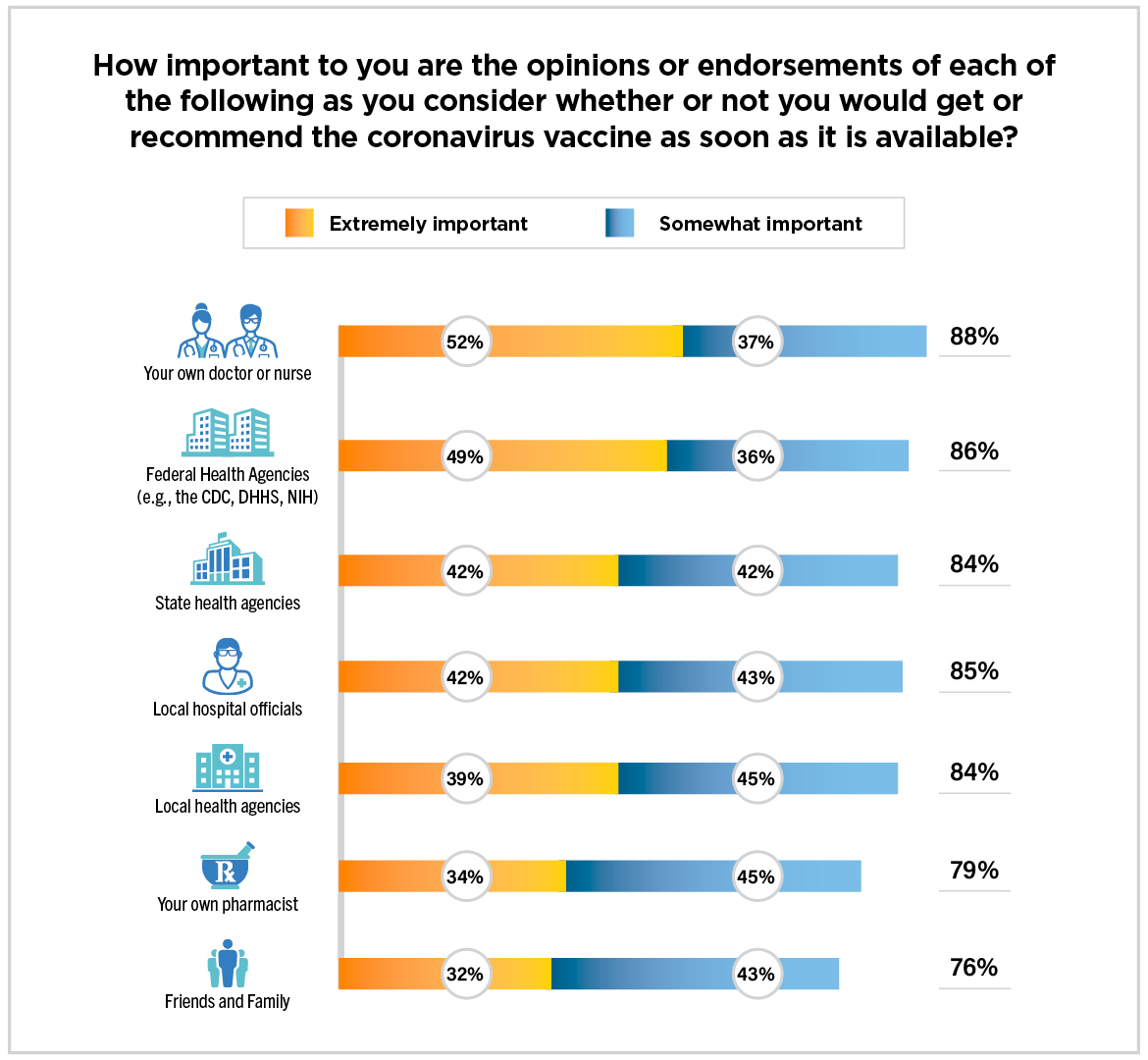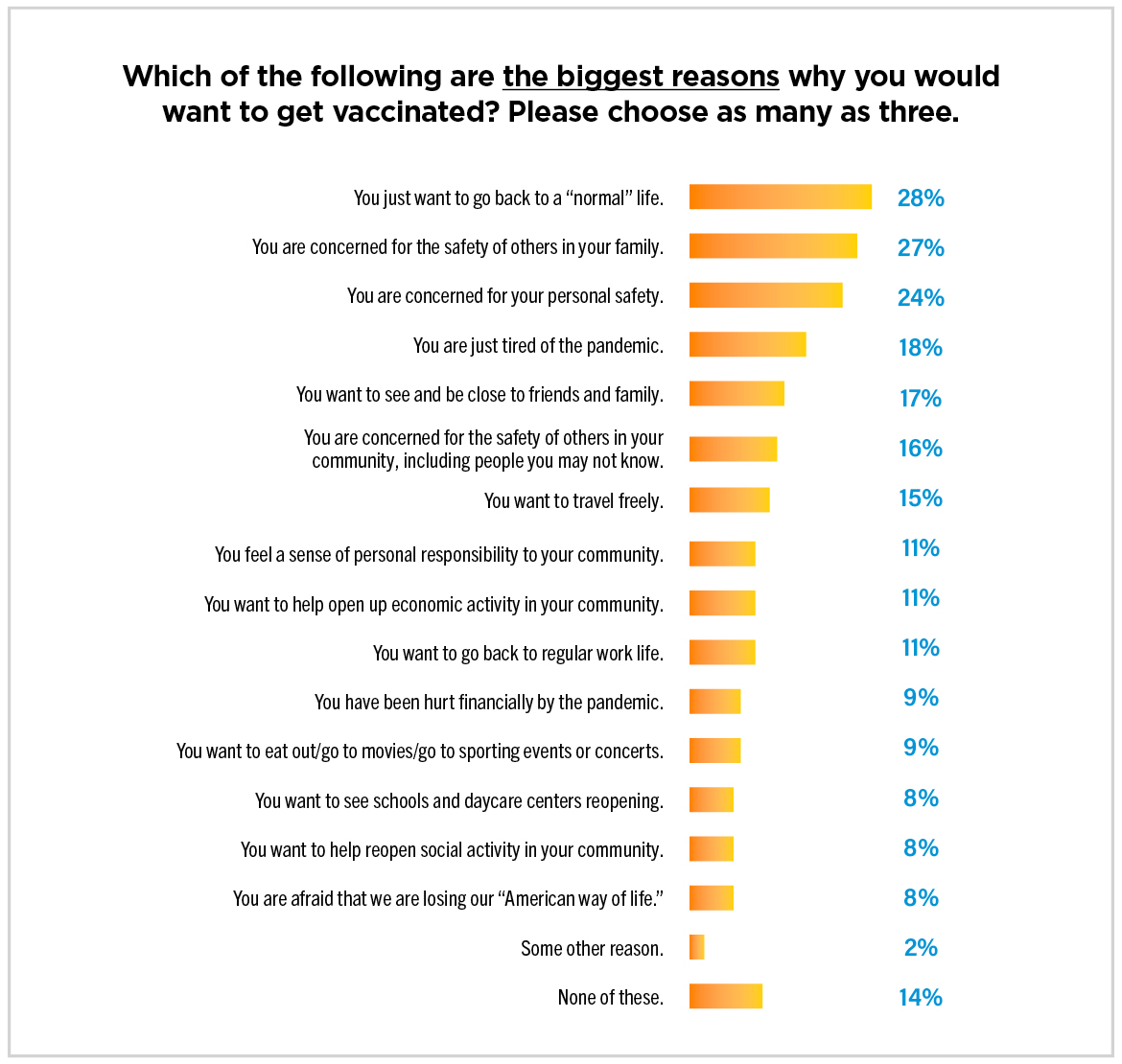Washington, D.C. – A new nationwide survey finds a strong majority of Americans are eager for a COVID-19 vaccine and interested in news coverage that provides expert testimony on the safety and efficacy of vaccination, the National Association of Broadcasters (NAB) and the Donald W. Reynolds Journalism Institute (RJI) announced today. The survey also finds that a desire to get back to normal is the biggest motivator for getting vaccinated and that media organizations could encourage vaccinations by focusing on messages regarding reducing loss of life and helping others.
The survey, conducted by the research firm SmithGeiger, is a first of its kind study of the challenges and opportunities facing local and national media presented by the deployment of COVID-19 vaccines. The research examines attitudes towards the vaccines, the information the public is seeking about the vaccine and the potential effectiveness of various vaccine education messages. Conducted December 4-12, the research surveyed 3,046 adults aged 18-64 who consume at least some news media at least once a week, with census-reflective quotas for age, gender, ethnicity and geography.
 |
When it comes to receiving news, local news (TV, radio and print) is cited by respondents as the most reliable source of information. The information respondents want most centers on the safety and efficacy of the vaccine. The most important voices to these respondents are those of their own doctors and nurses (88%) followed by experts at federal, state and local health agencies (87%), their own pharmacist (82%) and friends and family (78%).
The survey finds the most impactful local news reporting would be an investigation into the safety/effectiveness of a vaccine or recommendations focused on wearing masks, with 58% of respondents saying this type of coverage would lead them to trust that news organization more.
Respondents express a strong preference for stories that “make recommendations based on detailed reporting,” to facilitate personal health decisions, rather than stories that offer information without recommendations or personal stories from journalists about the pandemic. They express a preference for coverage that focuses on “just the facts.”
Respondents prefer messaging that highlights concern for others, such as, “Don’t put your family through the pain of losing you…” and, “Protect yourself, protect your neighbors…”. In both cases, roughly half of all respondents say they are more likely to get vaccinated as a result of seeing that message, versus just 16% who are less likely.
Overall, the survey finds that six out of 10 respondents express an intent to get a COVID-19 vaccine once it becomes available to them, with just 13% of respondents saying they “definitely will not” get vaccinated. Respondents who are immune-compromised are much more likely to get vaccinated than those who are not, with almost three-quarters of immune-compromised respondents expressing an intent to get a vaccine when it becomes available.
 |
Those who express hesitance to get the vaccine cite concerns regarding safety and efficacy. One in four cite concerns about safety as a reason they would avoid it, and more than half of all respondents worry about the thoroughness of the vaccine’s testing phase (51%), about the effectiveness of early versions of the vaccine (54%) or that the vaccine itself will make people sick (52%).
Of note, African Americans are significantly more worried (63%) than the broader public about the vaccine making people sick, and significantly less confident that it has been adequately tested (42%).
“Since the pandemic’s early days, Americans have turned to broadcast radio and television for the most reliable news, to stay connected, learn how their communities are affected and find out what they need to do to remain healthy,” said NAB President and CEO Gordon Smith. “With these new survey findings, broadcasters will continue serving the public by sharing information that encourages people to stay safe and help our nation recover.”
“It’s no surprise that providing information about the COVID-19 vaccine is not a one-size-fits-all effort,” said Randy Picht, RJI’s executive director. “We think this research, which included a larger-than-usual number of respondents, will be useful to all news organizations as they cover one of the most important stories right now and in 2021.”
The survey’s results will be used by NAB and RJI for a messaging toolkit focused on a local and regional approach to effective vaccine education communications.
The toolkit – anticipated to be available in early 2021 – will include regional research findings, sample messaging and suggested tactics to help local stations craft vaccine education messages that will best resonate with their listeners and viewers. These resources will be available in English and Spanish and shared with all local radio and television stations, journalists and partner groups serving culturally diverse communities.
*Updated with number of survey participants.
About
NAB
The National Association of Broadcasters is the premier advocacy association for America's broadcasters. NAB advances radio and television interests in legislative, regulatory and public affairs. Through advocacy, education and innovation, NAB enables broadcasters to best serve their communities, strengthen their businesses and seize new opportunities in the digital age. Learn more at www.nab.org.